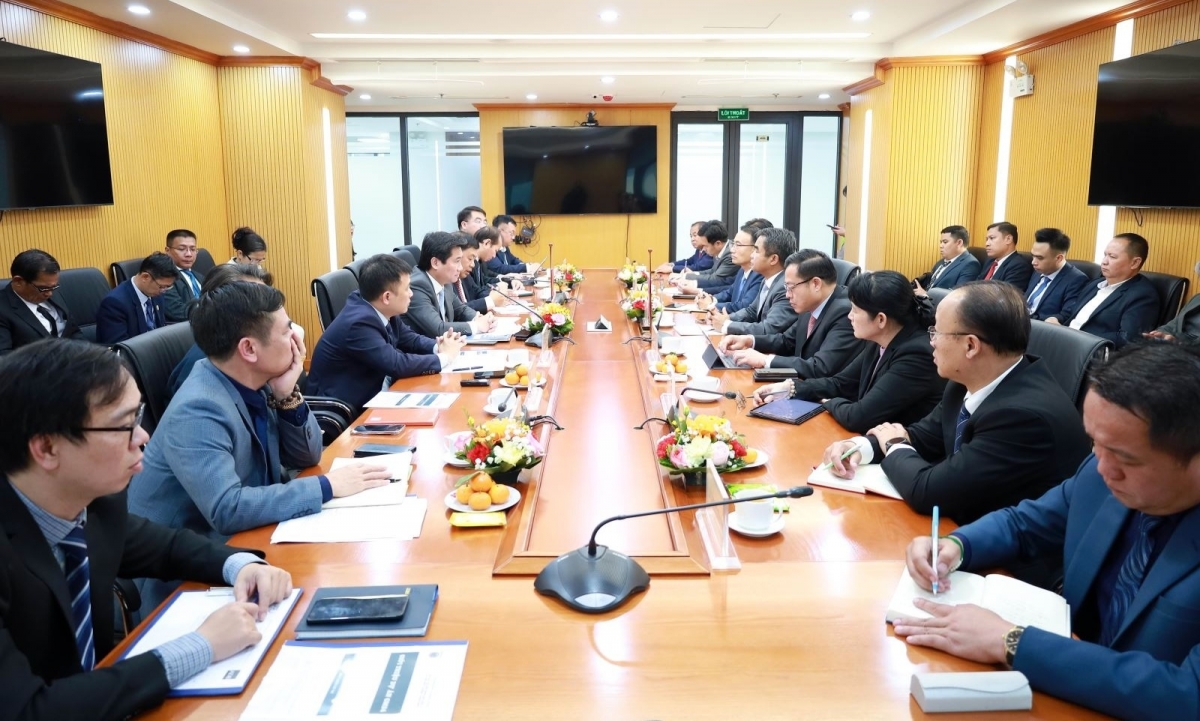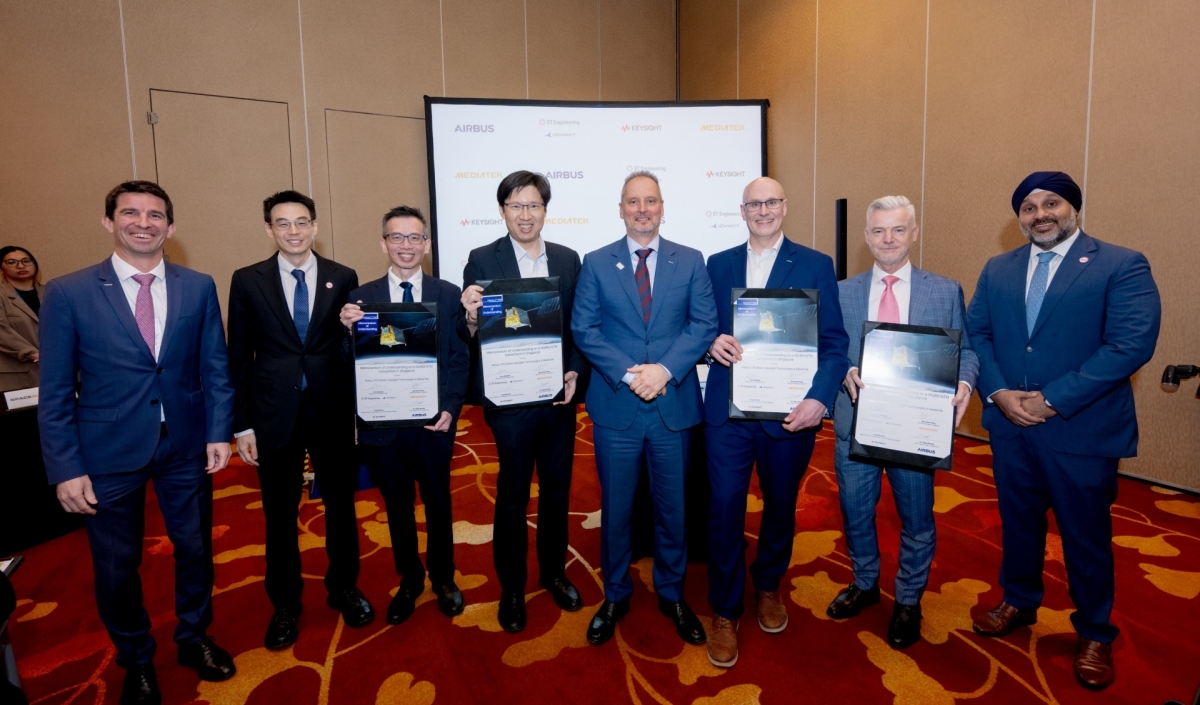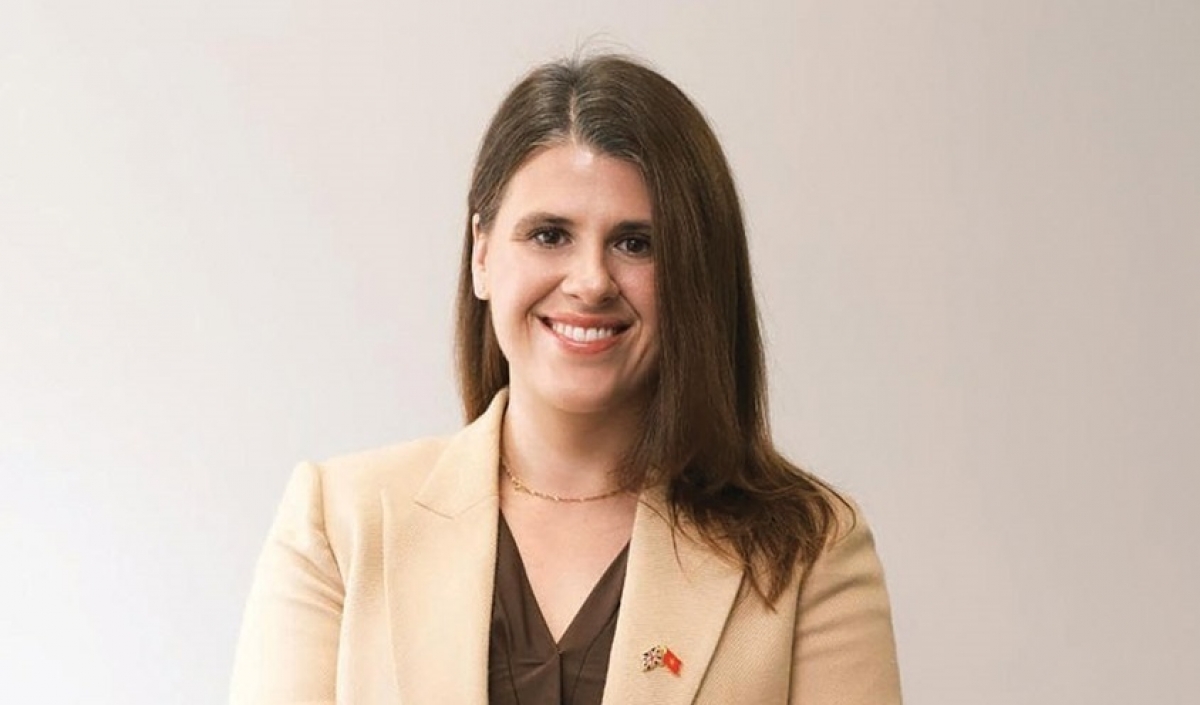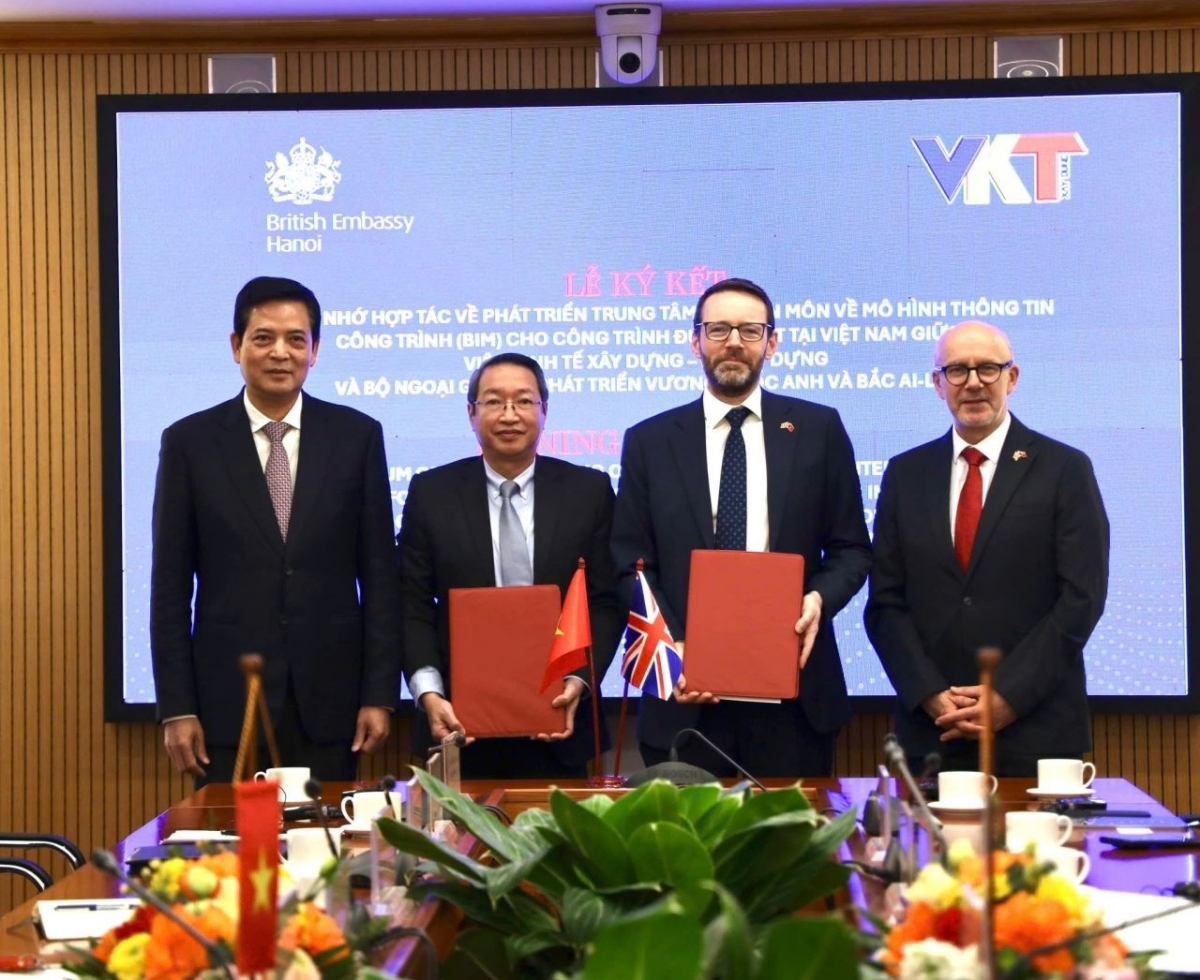INTERNATIONAL INVESTMENT
AND PORTAL
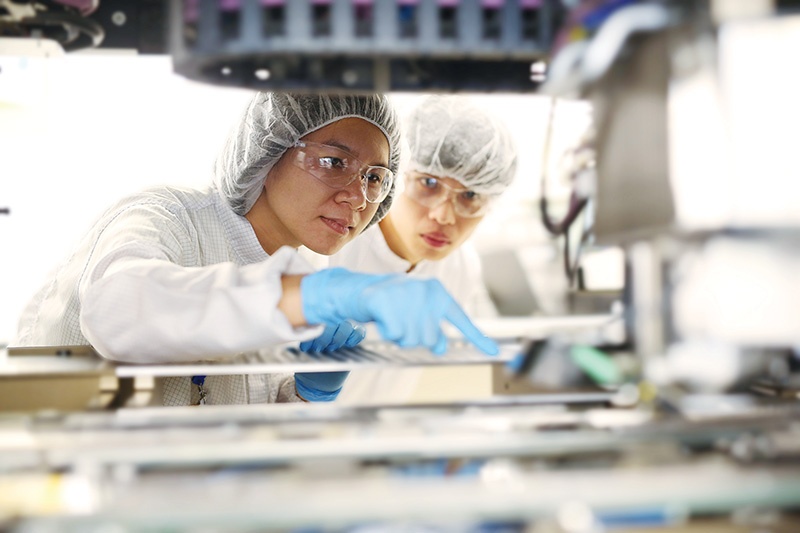 After a nearly non-existent relationship 25 years ago, Vietnam is now one of the US’ top 10 trading partners, Photo: Le Toan
After a nearly non-existent relationship 25 years ago, Vietnam is now one of the US’ top 10 trading partners, Photo: Le Toan
This year, leaders of both Vietnam and the US are expectedly scheduled to exchange high-level visits, laying a firm foundation for the two countries to increase their ties, with a prime focus laid on expanding trade and investment cooperation.
It is likely that a Vietnamese leader will pay a visit to the US on the occasion of the ASEAN-US Summit held in Washington, D.C in early 2022. Meanwhile, a US leader will likely visit Vietnam on the occasion of the Asia-Pacific Economic Cooperation (APEC) in Thailand or the ASEAN Summit 2022 in Cambodia.
“In early 2022, Vietnam and the US will hold a trade ministerial-level meeting to deal with obstacles for boosting trade and investment ties between the two sides,” Le Cong Tien, vice general director of the Ministry of Foreign Affairs’ Department of the Americas, told VIR.
“In the coming time, both sides will centre on beefing up trade and investment cooperation as one of the biggest priorities in their bilateral relationship,” Tien said. “After the US launches its Indo-Pacific Economic Framework and after the two countries reach consensus in removing such obstructions in trade and investment, a new framework is expected to be formulated for expanding ties.”
The US administration of President Joe Biden will gear up to launch an Indo-Pacific Economic Framework to deepen engagement with the region, expected in early this year. Currently, details about the framework remain unclear as discussions on the framework are in preliminary stages, but could involve several key areas including the digital economy, supply chain resiliency, infrastructure, export control, and clean energy, according to the US Department of Commerce.
Under the US’ strategy, the Indo-Pacific region will shape the trajectory of the world in the 21st century. Being the fastest-growing region on the planet, it accounts for 60 per cent of the world economy and two-thirds of all economic growth over the last five years.
New cooperation framework expected
On January 4, Marc Knapper was sworn in as the new US ambassador to Vietnam during a ceremony at the headquarters of the US Department of State.
“Congratulations to Ambassador Marc Knapper on his swearing-in as the new United States ambassador to Vietnam!” the Bureau of East Asian and Pacific Affairs tweeted. “The United States supports a strong, independent, and prosperous Vietnam.”
Testifying before the Senate last July, then-nominee for the role Knapper, said, “Right now, we have what we call a comprehensive partnership. We hope to raise it to a strategic partnership, and I will take steps to do that by strengthening even further our security relationships with Vietnam.”
The two countries should focus on four main fields including security, investment and trade, post-war settlement, and people-to-people exchange, Knapper said.
During her visit to Vietnam last August, US Vice President Harris reaffirmed the US commitment to a strong, prosperous, and independent Vietnam, as well as a free, open, healthy, and resilient Indo-Pacific region. “I would also ask that, while we are here, that we consider doing what we can to upgrade our relationship as a strategic partnership. This will send a positive message to our governments, and our people, and the region as we deepen our relationship,” she told Vietnam’s State President Nguyen Xuan Phuc.
Vietnam and the US during this visit riveted their bilateral ties in many areas, including health security; combatting climate change; development assistance and market access; addressing legacy of war issues; investments in the bilateral relationship; peaceful exploration of space; and higher education.
Over 10 years since the US officially offered a strategic partnership with Vietnam during a visit from then-Secretary of State Hillary Clinton, the Biden administration has also signalled its desire for such a partnership. Its Interim National Security Strategic Guidance, issued in March last year, named Vietnam as one of a few countries that the US would focus on to “deepen our partnership … to advance shared objectives.”
Elevating bilateral relations to a strategic partnership would seem befitting of the ascended cooperation between the two countries and set the ground for more strategic cooperation.
Currently, Vietnam and the US are discussing the content of such a strategic partnership which must benefit both nations. If this is materialised, the trade and investment ties will be expanded to a higher level.
Swelling trade and investment
It is expected that in 2022, the US and Vietnam will continue to meet regularly on trade and investment issues, including under their 2007 Trade and Investment Framework Agreement, which provides a platform for addressing bilateral issues, monitoring Vietnam’s implementation of its World Trade Organization accession commitments, and coordinating on regional and multilateral issues.
Under this agreement, Vietnam and the US “affirm their desire to promote attractive investment climates in their respective territories and to expand and diversify their trade in products and services,” and “desire to enhance the bonds of friendship and spirit of cooperation, expand trade, and strengthen economic relations between the parties on the basis of equality and mutual benefit.”
According to Vietnam’s General Statistics Office, last year the US was Vietnam’s largest export market, with an estimated turnover of $95.6 billion, up 24.1 per cent on-year. The US was also Vietnam’s sixth largest import market, with an estimated turnover of $15.5 billion, up 12.9 per cent on-year.
Under the Department of Commerce’s latest data, US exports of goods and services to Vietnam supported an estimated 65,000 jobs in 2019, with 53,000 supported by goods exports and 12,000 supported by services exports.
In terms of investment, Vietnam’s Ministry of Planning and Investment reported that accumulatively as of December 20, 2021, total US registered investment capital in Vietnam reached $10.28 billion for 1,138 valid projects, making the US the 11th biggest foreign investor in Vietnam. In 2021 alone, the US became the eighth biggest foreign investor in the Southeast Asian market, with total registered capital of $738.66 million.
Recently Vietnamese Minister of Industry and Trade Nguyen Hong Dien met with leaders of the US’ AES Corporation in New York to discuss the firm’s investment and business activities in Vietnam. Dien said Vietnam’s government highly valued American investors like AES, Cargill, Intel, and Nike, which are contributing to Vietnam’s economic development.
“They have helped promote Vietnam as a reliable investment location, contributing to the strategic trust between both nations,” he said.
Minister Dien and leaders of PetroVietnam, PetroVietnam Gas Joint Stock Corporation, and AES witnessed a signing ceremony to establish the joint venture – Son My LNG Port Warehouse Co., Ltd.
The establishment aims to invest in the construction of the Son My LNG port warehouse in the south-central province of Binh Thuan. The project has total expected investment capital of $1.31 billion with an annual capacity of 3.6 million tonnes. The facility will receive, process, and supply gas for the Son My 1 and Son My 2 power plants in Binh Thuan, expected to become operational in late 2025.
During his September 2021 attendance in New York at the 76th session of the UN General Assembly, Vietnamese State President Phuc hosted separate receptions for leaders of major US companies which want to increase investments in Vietnam. These enterprises included GE Group, CFM International, AviaWorld LCC, Cantor Fitzgerald, Weidner Asset Management Steelman Partners, DeLong, Valero, AGP, and UPC Group. They said Vietnam is a dynamic market with great potential and hoped to expand their business and investment in the country.
President Phuc also witnessed the signing of an agreement worth nearly $2 billion between Vietnam’s Bamboo Airways and General Electric’s GE Aviation. Under the deal, the airline will purchase GENx engines, which will be delivered next year, to power its Boeing 787-9 Dreamliner aircraft and a maintenance package for its Boeing 787-9 fleet.
After a nearly non-existent relationship a quarter of a century ago, now Vietnam is one of the US’ top 10 trading partners in the world, and its economy is critical to the supply chains that the US relies on. Many US big companies have also been investing in Vietnam.
“We have deepened our economic ties as Vietnam’s second-largest trading partner and its top export market worldwide, and our support for one another is mutually reinforcing: a vibrant Vietnamese economy is critical to the supply chains Americans depend on, a point that the current pandemic has made clear when production shutdowns abroad have led to difficulties in shipping goods at home,” said a White House statement.


